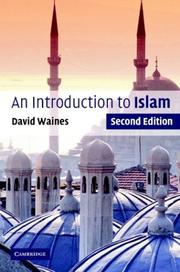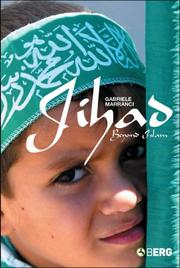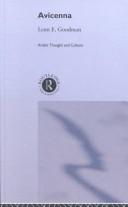| Listing 1 - 10 of 52 | << page >> |
Sort by
|
Book
ISBN: 1438473354 9781438473352 9781438473338 1438473338 1438473346 Year: 2019 Publisher: Albany, New York : Suny Press,
Abstract | Keywords | Export | Availability | Bookmark
 Loading...
Loading...Choose an application
- Reference Manager
- EndNote
- RefWorks (Direct export to RefWorks)
The Repose of the Spirits is a translation of one of the earliest and most comprehensive treatises on Sufism in the Persian language. Written by Aḥmad Sam'ānī, an expert in Islamic law from a famous Central Asian scholarly family in about the year 1135, it is one of the handful of early Sufi texts available in English and is by far the most accessible. It also may well be the longest and the most accurately translated. Ostensibly a commentary on the divine names, it avoids the abstract discourse of theological nitpicking and explains the human significance of the names with a delightful mix of Quranic verses and sayings of the Prophet and various past teachers, interspersed with original interpretations of the received wisdom. Unlike the usual books on the divine names (such as that of al-Ghazali), The Repose of the Spirits reminds the reader of the later poetical tradition, especially the work of Rumi. The prose is richly embroidered with imagery and interspersed with a great variety of Arabic and Persian poetry. What is especially remarkable is the manner in which the author speaks to his readers about their own personal situations, explaining why they are driven by a love affair with God, a God who is full of compassion and good humor, whether they know it or not. William C. Chittick's masterful new translation brings this work to an English-language audience for the first time.
Sufism --- God (Islam) --- Allah --- Monotheism (Islam) --- Islam --- Name
Book
ISBN: 9781474401784 9781474401791 9781474401807 9781474401777 1474401783 1474401775 1474401805 1474401791 9781474401808 9781469623276 1469623277 Year: 2015 Publisher: Edinburgh, [Scotland] : Edinburgh University Press,
Abstract | Keywords | Export | Availability | Bookmark
 Loading...
Loading...Choose an application
- Reference Manager
- EndNote
- RefWorks (Direct export to RefWorks)
Engaging with the age old question of who is the God of Islam, Bruce B. Lawrence stakes out the historical nuance of Allah throughout the past 1500 years, from the earliest mention of his name to his appropriate by cyberspace.
297.12 --- Islam: theologie; doctrine --- 297.12 Islam: theologie; doctrine --- God (Islam) --- Dieu (Islam) --- Allah --- Monotheism (Islam) --- Islam
Book
ISBN: 9024720311 9004287124 9789004287129 9789024720316 Year: 1977 Publisher: The Hague Nijhoff
Abstract | Keywords | Export | Availability | Bookmark
 Loading...
Loading...Choose an application
- Reference Manager
- EndNote
- RefWorks (Direct export to RefWorks)
Indonesia
Sufism --- Religion --- Philosophy & Religion --- Islam --- Sofism --- Mysticism --- Jaʻbarī, Arslān ibn Yaʻqūb, --- indonesia --- Allah --- Arabic --- God --- God in Islam --- Malay language --- Palembang --- Polytheism --- Shirk (Islam)
Book
ISBN: 9004279695 9789004279698 9789004278387 9004278389 1322213658 Year: 2014 Publisher: Leiden, Netherlands : Brill,
Abstract | Keywords | Export | Availability | Bookmark
 Loading...
Loading...Choose an application
- Reference Manager
- EndNote
- RefWorks (Direct export to RefWorks)
Early Christian-Muslim Debate on the Unity of God examines the writings of three of the earliest known Christian theologians to write comprehensive theological works in Arabic. Theodore Abū Qurra, Abū Rā’iṭa and ‘Ammār al-Baṣrī provide valuable insight into early Christian-Muslim debate shortly after the rise of the Islamic empire. Through close examination of their writings on the doctrine of the Trinity, Sara Husseini demonstrates the creativity of these theologians, who make use of language, style and argumentation characteristic of Islamic theological thought (kalām), in order to help articulate their long-established religious truths. Husseini offers close analysis of the authors individually and comparatively, exploring their engagement with Islamic theology and their role in this fascinating period.
God --- God (Islam) --- Christianity and other religions --- Islam --- Allah --- Monotheism (Islam) --- Metaphysics --- Misotheism --- Theism --- Simplicity --- History of doctrines. --- Islam. --- Relations --- Christianity.
Book
ISBN: 0271087099 0271088559 Year: 2020 Publisher: University Park, Pennsylvania : The Pennsylvania State University Press,
Abstract | Keywords | Export | Availability | Bookmark
 Loading...
Loading...Choose an application
- Reference Manager
- EndNote
- RefWorks (Direct export to RefWorks)
The Ansaru Allah Community, also known as the Nubian Islamic Hebrews (AAC/NIH) and later the Nuwaubians, is a deeply significant and controversial African American Muslim movement. Founded in Brooklyn in the 1960s, it spread through the prolific production and dissemination of literature and lecture tapes and became famous for continuously reinventing its belief system. In this book, Michael Muhammad Knight studies the development of AAC/NIH discourse over a period of thirty years, tracing a surprising consistency behind a facade of serial reinvention.It is popularly believed that the AAC/NIH community abandoned Islam for Black Israelite religion, UFO religion, and Egyptosophy. However, Knight sees coherence in AAC/NIH media, explaining how, in reality, the community taught that the Prophet Muhammad was a Hebrew who adhered to Israelite law; Muhammad’s heavenly ascension took place on a spaceship; and Abraham enlisted the help of a pharaonic regime to genetically engineer pigs as food for white people. Against narratives that treat the AAC/NIH community as a postmodernist deconstruction of religious categories, Knight demonstrates that AAC/NIH discourse is most productively framed within a broader African American metaphysical history in which boundaries between traditions remain quite permeable.Unexpected and engrossing, Metaphysical Africa brings to light points of intersection between communities and traditions often regarded as separate and distinct. In doing so, it helps move the field of religious studies beyond conventional categories of “orthodoxy” and “heterodoxy,” challenging assumptions that inform not only the study of this particular religious community but also the field at large.
Nuwaubian movement --- African Americans --- History. --- Religion. --- York, Dwight, --- Nubian Islamic Hebrews --- American Islam. --- Ansaaru Allah. --- Ansaru Allah. --- Black Islam. --- Black religion. --- Bushwick. --- Islam. --- Islamic hip hop. --- Malachi Z. York. --- Moorish Science. --- Nation of Islam. --- Nubian Islamic Hebrews. --- Nuwaubian. --- Nuwaubu. --- Nuwaupian. --- Nuwaupu. --- Rizq. --- Sudan. --- Sudanese diaspora – U.S. --- Supreme Mathematics. --- hip hop.
Book
ISBN: 9780271088556 0271088559 9780271087092 0271087099 Year: 2020 Publisher: University Park, Pennsylvania : The Pennsylvania State University Press,
Abstract | Keywords | Export | Availability | Bookmark
 Loading...
Loading...Choose an application
- Reference Manager
- EndNote
- RefWorks (Direct export to RefWorks)
The Ansaru Allah Community, also known as the Nubian Islamic Hebrews (AAC/NIH) and later the Nuwaubians, is a deeply significant and controversial African American Muslim movement. Founded in Brooklyn in the 1960s, it spread through the prolific production and dissemination of literature and lecture tapes and became famous for continuously reinventing its belief system. In this book, Michael Muhammad Knight studies the development of AAC/NIH discourse over a period of thirty years, tracing a surprising consistency behind a facade of serial reinvention.It is popularly believed that the AAC/NIH community abandoned Islam for Black Israelite religion, UFO religion, and Egyptosophy. However, Knight sees coherence in AAC/NIH media, explaining how, in reality, the community taught that the Prophet Muhammad was a Hebrew who adhered to Israelite law; Muhammad’s heavenly ascension took place on a spaceship; and Abraham enlisted the help of a pharaonic regime to genetically engineer pigs as food for white people. Against narratives that treat the AAC/NIH community as a postmodernist deconstruction of religious categories, Knight demonstrates that AAC/NIH discourse is most productively framed within a broader African American metaphysical history in which boundaries between traditions remain quite permeable.Unexpected and engrossing, Metaphysical Africa brings to light points of intersection between communities and traditions often regarded as separate and distinct. In doing so, it helps move the field of religious studies beyond conventional categories of “orthodoxy” and “heterodoxy,” challenging assumptions that inform not only the study of this particular religious community but also the field at large.
Nuwaubian movement --- African Americans --- History. --- Religion. --- York, Dwight, --- Nubian Islamic Hebrews --- American Islam. --- Ansaaru Allah. --- Ansaru Allah. --- Black Islam. --- Black religion. --- Bushwick. --- Islam. --- Islamic hip hop. --- Malachi Z. York. --- Moorish Science. --- Nation of Islam. --- Nubian Islamic Hebrews. --- Nuwaubian. --- Nuwaubu. --- Nuwaupian. --- Nuwaupu. --- Rizq. --- Sudan. --- Sudanese diaspora – U.S. --- Supreme Mathematics. --- hip hop.
Book
ISBN: 9027632499 Year: 1994 Volume: *1 Publisher: Tilburg Zwijsen
Abstract | Keywords | Export | Availability | Bookmark
 Loading...
Loading...Choose an application
- Reference Manager
- EndNote
- RefWorks (Direct export to RefWorks)
Waarom zijn oneerlijke mensen rijk en belangrijk? En waarom zijn andere mensen, waar niets op aan te merken valt, arm en niet belangrijk? Een arme boer gaat op reis, vastbesloten om Allah te ontmoeten en hem deze vragen te stellen...
Islam --- Godsdienst --- Verhalen --- islam --- verhalen --- 219 --- Islam - verhalen --- 217.0 --- Allah --- overige godsdiensten --- Filosofie --- Psychologie --- Sociologie --- Maatschappij --- Politiek --- Seksualiteit --- Theater --- Wetenschap --- Architectuur --- Man --- Film --- Cultuur --- Erfelijkheidsleer --- Stadssamenleving --- Media --- Kleuter --- Verpleegkunde --- Volwassene --- Technologie --- Kind --- Geschiedenis --- Voorlichting --- Verhaal

ISBN: 0521539064 0521831415 1316223817 1316223418 0511801033 Year: 2003 Publisher: Cambridge : Cambridge University Press,
Abstract | Keywords | Export | Availability | Bookmark
 Loading...
Loading...Choose an application
- Reference Manager
- EndNote
- RefWorks (Direct export to RefWorks)
This wide-ranging account of the history and theology of one of the world's most dynamic religions tells the story of Islamic beliefs and practices as they developed from the earliest times down to the present day. For this revised and updated second edition, David Waines has added a long section tackling head-on the issues arising from Islam's place in the changing world order at the turn of the new millennium. The wars in Bosnia, Afghanistan and Israel, and the terrorist attacks on New York and Washington, have raised global awareness of Islam at a superficial level - but little has been written which considers Islamic political and military extremism in relation to mainstream Muslim history and theology. Coming at the end of a book which has explored the ideas and traditions of Islam in depth, this new section offers thought-provoking reflections on the place of religion in the current conflicts.
297 --- Islam. Mohammedanisme --- Islam --- Islam. --- Mohammedanism --- Muhammadanism --- Muslimism --- Mussulmanism --- Religions --- Muslims --- Islam and culture. --- Culture and Islam --- Culture --- Islamic civilization --- Allah --- the Prophet Muhammad --- the Qur'an --- Bosnia --- Afghanisatn --- Israel --- Palestine --- New York --- Washington --- terrorism --- Islamic history --- Islamic thought

ISBN: 1845201582 1845201574 9781845201586 9781845201579 1000183262 1003085784 1000189899 9786612545573 1474215033 1282545574 1847881297 9781003085782 9781000183269 9781000186772 1000186776 9781847881298 9781000189896 9389165865 Year: 2006 Publisher: Oxford: Berg,
Abstract | Keywords | Export | Availability | Bookmark
 Loading...
Loading...Choose an application
- Reference Manager
- EndNote
- RefWorks (Direct export to RefWorks)
'Jihad' is a highly charged word. Often mistranslated as 'Holy War', it has become synonymous with terrorism. Current political events have entirely failed to take account of the subtlety and complexity of jihad. Like many concepts with a long history, different cultural ideas have influenced the religious aspects of jihad. As a result its original meaning has been adapted, modified and destabilized - never more than at the present time. How does jihad manifest itself in Muslims' everyday lives? What impact has 9/11 and its backlash had on jihad? By observing the current crisis of identity among ordinary Muslims, this timely book explores why, and in what circumstances Muslims speak of jihad. In the end, jihad is what Muslims say it is. Marranci offers us a nuanced and sophisticated anthropological understanding of Muslims' lives far beyond the predictable cliches.
Jihad --- TERRORISM -- 171 --- CULTUUR -- 171 --- ISLAM -- 323.21 --- TERRORISM -- 323.21 --- ISLAM -- 008 --- TERRORISM -- 008 --- ISLAM -- 171 --- Islamic fundamentalism -- Sources. --- Jihad. --- Jihad -- Sources. --- Islam --- Religion --- Philosophy & Religion --- sociology --- antropologie --- sociologie --- anthropology --- Allah --- Antisemitism --- Muslims --- Quran

ISBN: 1134977794 1134977808 1280555823 9786610555826 0203026624 0415245753 9780415245753 9780203026625 9780415019293 041501929X 9780415074094 0415074096 6610555826 041501929X 0415074096 9781134977802 9781280555824 9781134977796 9781134977758 Year: 1992 Publisher: London ; New York : Routledge,
Abstract | Keywords | Export | Availability | Bookmark
 Loading...
Loading...Choose an application
- Reference Manager
- EndNote
- RefWorks (Direct export to RefWorks)
the philosophers in the West, none, perhaps, is better known by name and less familiar in actual content of his ideas than the medieval Muslim philosopher, physician, minister and naturalist Abu Ali Ibn Sina, known since the days of the scholastics as Avicenna. In this book the author, himself a philosopher, and long known for his studies of Arabic thought, presents a factual account of Avicenna's philosophy. Setting the thinker in the context of his often turbulent times and tracing the roots and influences of Avicenna's ideas, this book offers a factual philosophical portrait. It details
Avicenna, --- Al-Hosain ben Abdallah ben Sînâ, Abou Alî --- Avicenna Latinus --- Avicenne --- Avicene --- Ibn Sīnā, al-Husayn ibn 'Abd Allāh --- Al-Hoessein Ibn Abdoellah Ibn Sînâ, Abou Alî --- #GROL:SEMI-1<297> Avic --- Avicenna --- Avicenna, - 980-1037
| Listing 1 - 10 of 52 | << page >> |
Sort by
|

 Search
Search Feedback
Feedback About UniCat
About UniCat  Help
Help News
News